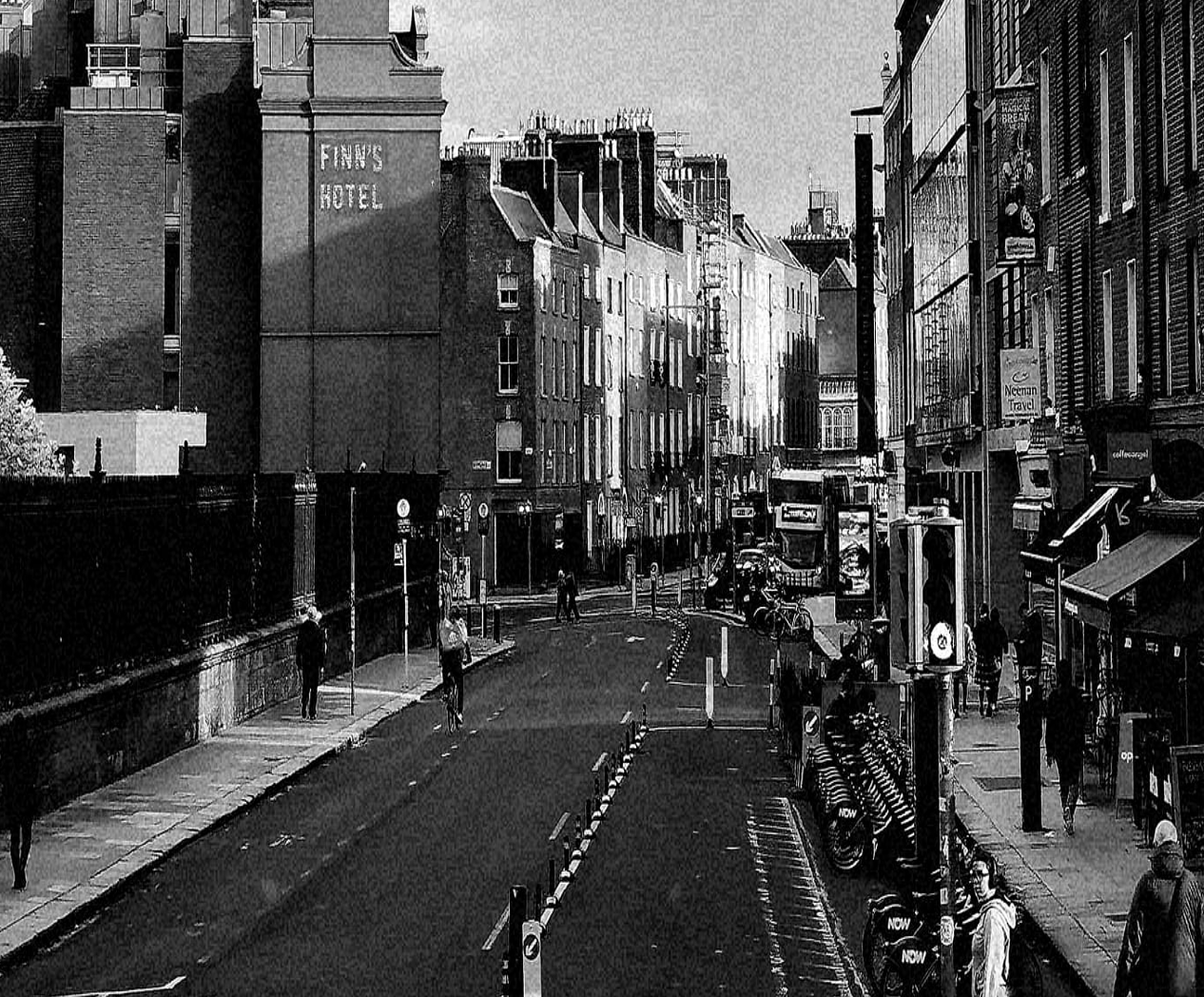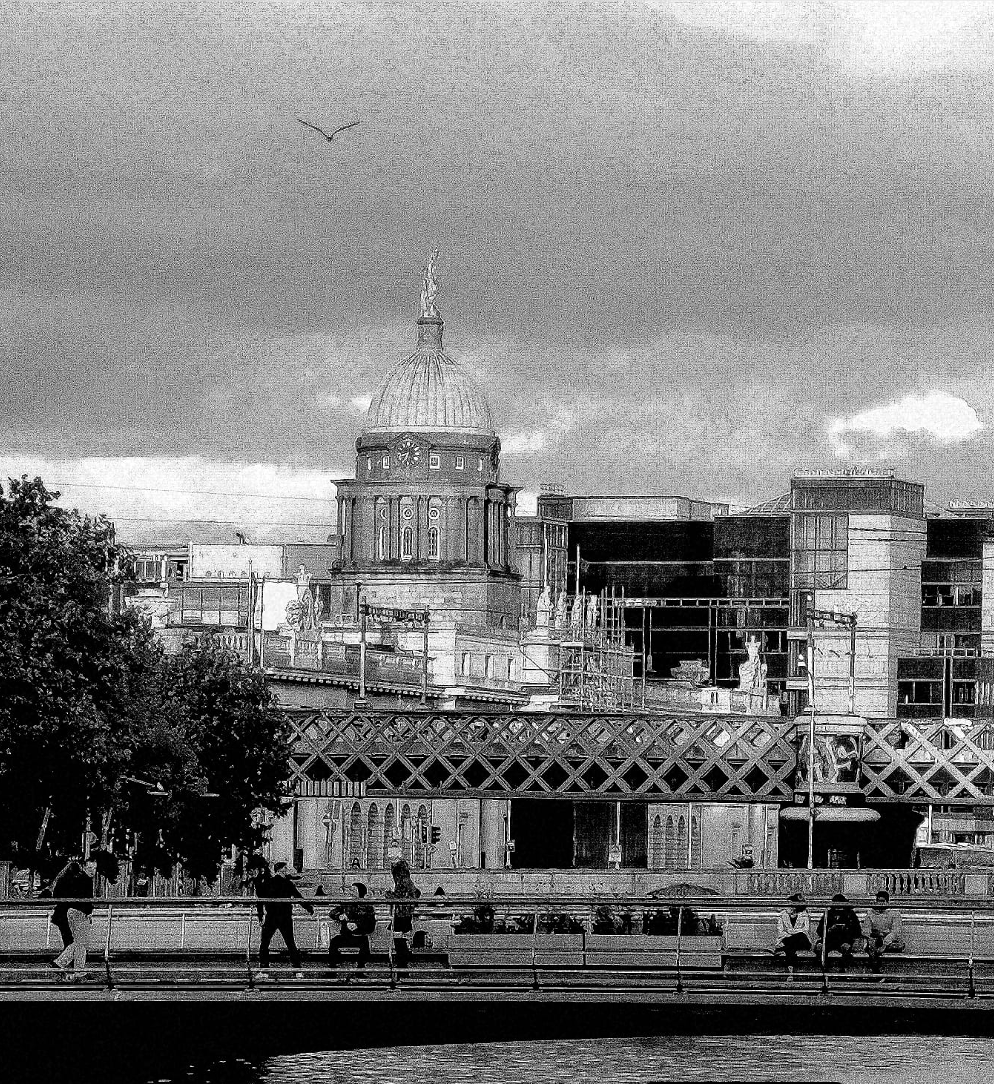Images: © by Fanny Cheseaux
Author: Fanny Cheseaux

The seagull was croaking contently in the port. It had just stolen a juicy tomato and ham sandwich from a little old lady near Grand Canal and was gulping it down quickly. Standing between the agitated sea and the glass buildings of the Docks, its beak was shining, and its stomach slowly expanding. In its satisfaction, it couldn’t see the pair of eyes that were watching it intently. Blue eyes filled with hunger and a vast darkness that would have scared animals and humans alike.
The man was looking at it, crouched in his usual spot under an old alleyway that led to the shopping centre. Red marks like wires were barely hidden under his green sweatshirt that didn’t protect him any more against the vicious wet cold. The man was hungry, and it was lunchtime in the City. He could see the businessmen chatting on the phone while distractedly eating their 8 euros Moroccan-spiced chicken wraps.
He was thinking about how nice it would be to roast the seagull; about how cavemen had discovered fire one day; about the roast lambs on a stake of his youth, and how his foster dad would make him swirl in the air while the smell of slow cooking meat filled them all with joy.
But that was long ago – he hadn’t seen these people he had once called family for more than ten years now. The smell of meat cooking had been replaced with scents of sweat, tears and the piss of drunks on the cobblestone corners.
A woman with a long black coat walked briskly in front of him, giving him the usual look of pity and embarrassment. People did not seem to understand that this look wouldn’t feed him. The coins in his little paper cup were looking at him sadly. November was always rough for Bob.
He thought about extending his tired hands and stealing the sandwich from the seagull, but it flew away before Bob could even move more than his shoulder. Brave animal. The seagull was already high in the sky, surveying the city. Far away, the Poolbeg chimneys indicated the direction of the coast.

The seagull landed on the north bank of the river. On the dirty white fence, two of his congeners were already perched on their legs, looking as if they were discussing the news of the day: “Patrick, I read in the Times this morning that Dublin was the sixth most expensive capital in the world for renters.” “Captivating! Do tell me more, John.”
On the other side of the road stood an old building—the Bachelor’s Inn. Workers walked briskly in front of it. Students sometimes took a stroll along the bank and pictured themselves living there. They imagined the noises the wooden floor would make when they came home at 3 a.m. after drinking obscure pints downstairs.
Odhran, carrying all their hundred-euro books in a worn-out leather bag, passed the birds on the fence daily. Weird group of gulls, they would think. Whenever they saw the Inn on the way to the university, they would hope they could stay. How easy it would be, how comfortable. They could inhale the smell of decaying wood, which would replace the one of the cold cleanliness of their house. They could escape the sounds of broken minds, broken promises, and broken plates.
Odhran had tried everything: “Mom, Dad, please, I’m trying to study!”
They would say, with apologies on their face:
—Odhran, I’m sorry it always goes like this. Your dad makes it impossible for me.
—You know your mom is mental Odhran, right? It’s not my fault. Even her brothers say so.
—He screams at me for the most impossible things, why can’t he get a real job? I have to do everything here, while he goes out and wanders around the Wicklow mountains with his little mates.
—Don’t listen to her, kiddo. Just promise me you’ll never turn out like her.
—I know it’s hard for you, sweetheart, but please don’t leave me alone with him. What would I do?
So, every day at university, during the classes where teachers spoke too low, Odhran would hunt on their computer. Their eyes were glued to the screen, browsing renters’ websites and Facebook groups, such as “Dublin cheap rooms” or the university accommodation section. They would spend hours classifying and saving ads.
They played this game for hours with friends, criticizing the flaws of the apartments and rooms they found: I could never live there; there’s not enough natural light. This blue tiling is so tacky. Having a flatmate? Could never be me. Only three bathrooms in this flat? It made them laugh while they sipped their overpriced coffee. It made them forget the sad truth: they could never afford it anyway.
So Odhran would look once more, sadly, at the curious and mean seagulls and go on their two-hour commute – two buses and the DART – to go down to the kitchen, where dinner was served, and no one looked at each other in the eyes.

The girl was there, as usual, on the corner of Grafton Street. Lily. She was an easy target – the seagull prided itself on knowing how to recognize kind people from unkind people. It always came back to the kind ones. She was wrapped in her half-eaten velvet blanket, the face of a little dog poking from it. In her cup, some coins, a few 2 euros, some 5 cents. She had an old piece of bread in her bag.
She always liked the presence of the seagull. She was looking at its little round belly with its perfect white feathers, all tidied up in order – oh so clean and soft-looking – and she would wonder; how would it feel to catch it? To squeeze the little belly? To grab it by one of its dirty yellow legs, to bring it inside her blanket and hug it while it would shriek, trapped? So, every day, she gave it a little bit of her food of the day – and she didn’t always have a lot – and every day, it got a little bit closer to her. It was a job for the long haul.
But today wouldn’t be the day – not yet. She threw the piece of stale bread at it and watched it eat it voraciously. Charming, she thought. When it flew away, she returned to thinking about her plans for the night. She would go back to the shelter, and the walk was tiresome. How long could she afford to stay out before getting too cold?
Lily needed to find a public bathroom before walking back – or go to a restaurant, but the staff would usually shoot her dirty looks when she came in with her sleeping bag, her dog, and the blanket. But she had to find something to use for the first day of her period. Usually, it was toilet paper from the public bathroom that she would roll over and over again.
Once, she had found free period products when she infiltrated a fancy restaurant’s bathroom. Did all those women dressed in flowy flower dresses with their marine suit-wearing partners need free tampons and pads? Lily had taken all she could fit in her pocket, but the operation was risky. She had had to leave all her belongings and Barjo on the corner of the street. Everyone could have taken the little dog – but she was tired of bleeding through the toilet paper that was falling apart. The products had lasted her two cycles.
The cold was starting to pierce through the blanket and Barjo was wincing in pain. On the other side of the street, Lily saw Martha with her big colourful skirts. They waved at each other, in familiarity. She wondered how much the old lady had gotten today, in her usual spot by the Trinity bus stop.
The sun had set entirely behind the brick buildings, and the seagull was far away from the park, its nasty eyes looking for a place to rest. It was never cold, this seagull, it had many homes in the quiet town and it could land on any roofs to make a comfortable nest. Sometimes, it flew away to Bull’s Island beach to join its colony. Gliding through the night, it felt the eyes of all the shivery souls on the streets of Dublin following its flight through the polluted dark sky.
Tomorrow, it hoped to steal a smoked salmon and cream cheese sandwich.

